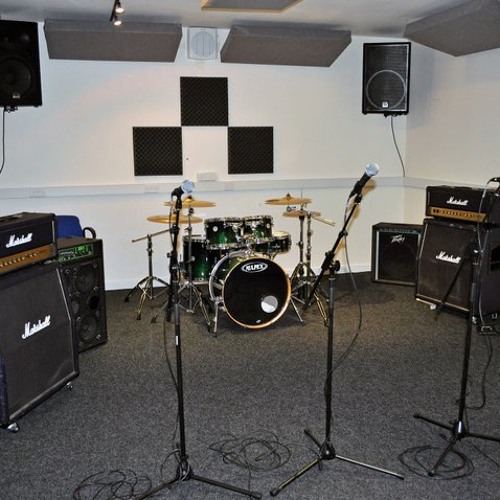Modern rehearsal rooms offer a range of benefits to bands and artists honing their craft, however the can also be your downfall if you’re not careful!

Modern rehearsal rooms are the devil’s playground, the cause of a huge amount of the bad sound we get at bar and club gigs all over the world!
Hear me out.
Now of course I’m only half serious. Modern rehearsal rooms provide a whole range of benefits to up and coming bands. For most bands, gone are the days of rehearsing in your garage, bedroom or basement and annoying both your family and the neighbours. Rehearsal complexes provide you with a relatively soundproofed space for you to play drums, guitars and other instruments at their normal volume without disturbing anyone too much.
They also often provide you with a lot of the equipment you will need, already set up in the room. At the very least they will have a small vocal PA set up so that the singer can be heard above the other instruments. But they will also often have a drumkit set up and a selection of guitar and bass amps provided so you can turn up, plug in, and are basically ready to get started. Some will even have basic recording facilities built into their rooms, and they will offer secondary facilities such as a tuckshop, and the ability to purchase essentials such as replacement drumsticks and guitar strings.
So all good right? There doesn’t seem to be any downside to using purpose built rehearsal facilities, and they seem to be a great place for bands and artists to practice their craft together.
However, I would strongly argue that their biggest advantage is also their biggest downfall when it comes to then translating your performance to the actual stage in a typical small, or even fairly medium-sized, gig: soundproofing.
You have the ability to turn your guitar and bass amps up as loud as you like, and to really hammer away on the drums, safe in the knowledge that the only people really disturbed by it are yourselves (and of course, you’re all wearing ear protection, aren’t you? We know how important it is as musicians to protect our ears!)
But taken too far, this can develop bad habits that make it difficult, if not impossible, for you to get a really good sound at your live shows. We develop a feeling for volume. We get used to the thump of the kick drum, the depth of the bass guitar, the roar of the guitar amp at our backs.
Now don’t get me wrong it feels great, I’ve been there and know the feeling well. But the problem comes when we get too used to that feeling. When it doesn’t feel right without it, and when we need that volume to get into the song, and feel as if something is missing if we don’t have it. At this stage it becomes a issue, because unless you’re playing in an arena or stadium, this kind of volume will not be helpful for your live shows. There is a delicate balance between turning things up loud enough that the sound engineer can get a clear signal through the microphones and so you can hear yourself properly, and being so loud that the engineer doesn’t have anywhere to mix and is just doing damage control. And for many bands, unfortunately they feel as if the need to turn everything up far too loud, and they fall into the damage control category (have a look at our Mix Window article to understand more about this).
I know it’s hard, and I know it doesn’t feel as good, but in order to rescue your live shows you must learn to separate yourself from that feeling a little. More volume doesn’t mean a better show, especially if it means the sound engineer simply can’t mix your band properly and some of the instruments or vocals can’t be heard.
Learn to rehearse at a more sensible volume, that would actually represent a workable, realistic stage volume at a live show, and let the sound engineer do his job and present your band to the audience sounding as good as you possibly can.
Do that, and you’ll be well on your way to getting that Killer Live Sound.
